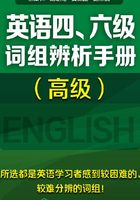
15 and all; and that; and all that; and so forth; and so on; and the like; and what not; what have you; and what-not
● 以上词组均意为“等等”,可互换,常用于句末,有细微区别。
● and all较正式,位于句末,一般不用逗号隔开。如:The fire destroyed the whole factory, machines and all.(大火烧毁了整个工厂、机械及其他一切。)The elephant swallowed the bread, apples and all.(大象把面包、苹果等全吞下去了。)The whole of the fish may be eaten, head, bones, tail and all.(鱼整个都可能被吃掉:头、骨、尾巴等等。)Tell me what the date is—year and all.(把日期告诉我—年月日都要。)
● and all that较强调其他同类物品,用于较正式口语中,多放在句末。and all that的简化形式是and that,如:I’ll tell you where to meet me and all that then.(我会告诉你在哪儿和我碰头及其他。)And I must say he’s a good-looking young follow—curly hair, dark eyes, and all that.(我要说他是个漂亮年轻的小伙子—卷头发、黑眼珠等等。)By cereals we mean wheat, oats, rye, barley, and all that.(谈到谷物,我们指的是小麦、燕麦、黑麦、大麦之类的东西。)Ah, but he’s known her all his life. Childhood sweethearts and all that. (哎,可他这一辈子是了解她的。孩提时的恋人以及诸如此类的事情。)They know I’m nearly always there and they can come and talk to me if they’ve got any problems and that.(他们知道我总是在那个地方,如果他们有问题什么的,可以来找我谈。)We spent over an hour clearing up all the worst paper and that which the trippers had left behind.(我们花了一个多小时才把旅游者扔下来的废纸等打扫干净。)
● and so forth; and so on两者更强调“同类”物品,and so forth较正式,and so on多用于口语,有时为强调可将两者合一为:and so forth and so on或and so on and so forth,常用于句末,一般用逗号分开。如:He always omitted pronouns and articles and so forth.(他总是疏忽代词、冠词等等。)The marchers carried flags, balloons, models and so forth.(游行者拿着旗帜、气球、模型等东西。)There are many forms of energy: heat energy, electrical energy, chemical energy, and so on.(能的形式有多种,如热能、电能、化学能等等。)She called him a liar, a hypocrite, a low-down swab and so on and so forth.(她骂他是谎言家、伪君子、可鄙的笨蛋,诸如此类,不一而足。)
● and the like强调已列举的同类物品,不常用。如:We bought chairs, tables, and the like.(我们买了椅子、桌子等等。)His pocket was filled with nails, marbles, string, worms and the like.(他的袋子里装满了钉子、弹子、线、螺纹管等。)The president sharply denounced in his speech the glaring absurdities of Hitler and the like.(总统在讲话中痛斥了希特勒之流的荒谬绝伦的言论。)We study English, history, biology, geography and the like.(我们学习英语、历史、生物、地理等等。)
● and what not或and what-not,放在句末时,可不用逗号隔开。如:I bought sugar, tea, eggs and what not.(我买了糖、茶、蛋等。)We found books, dictionaries, exercise-books what not in the box.(在箱子里我们发现了书、词典和练习本等。)The store sells big ones, small ones, medium ones, and what not.(店里有大号的、小号的、中号的等。)We decided to go camping, and loaded the car with tents and pots and pans and what not.(我们决定去野营,汽车上装载了帐篷以及锅瓢碗盏等炊事用具。)They loaded the suitcases, parcels, boxes and what-not into the boot of the car. (我们把小提箱、包裹、箱子等全都装进汽车行李箱里去了。)
● what have you与and what not可换用。不过,what前常用and或or。如:There are a lot of clothes, books and what have you for sale in her shop.(她的商店里有许多衣服、书籍可购。)The abandoned office was full of documents, books, and what have you.(这间不再使用的办公室里到处是文件、书籍等这类东西。)So many things are unsafe these days, food, milk, medicine, or what have you.(现在,不安全的东西太多了,食品、牛奶、药品等。)She has to deal with the various taxes and what have you.(她不得不应付各种税费等。)